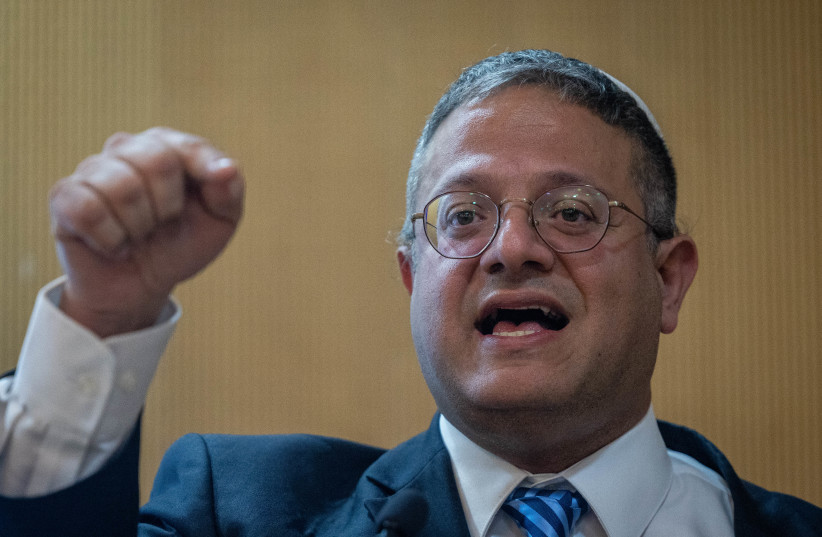While the judicial overhaul is still in its legislative stages and there are still alternative ideas on the table, in some areas the train has already left the station.
This is the case with regard to the recent decision by National Security Minister Itamar Ben-Gvir to freeze “Stop the Bleeding,” a program run by the American Jewish Joint Distribution Committee. The aim of this innovative program is just what its name suggests: To cope with the surging rates of crime and violence in the Arab society in Israel by means of a community-based model implemented in various towns. The initiative was under the umbrella of Government Resolution 549, passed in October 2021– a five-year plan for tackling the issue in a significant and comprehensive way.
The situation is so serious that it is clear that only a system-wide effort can address the problem effectively, especially in the face of the unprecedented and horrifying toll of 31 Arab murder victims since the start of 2023.
Why did Ben-Gvir cancel the program to fight Arab violence?
Why cancel the program? Because the minister said so. With no good reason, no justification, no investigation of alternatives, and no real understanding of the situation. Never mind that the program is the product of intensive work by the staff of several ministries, local authorities, and civil society organizations that worked hard for two years just to begin implementing its first stage.
But actually, you can’t really say there’s no reason behind this decision. According to news reports, Ben-Gvir claimed that JDC is a “leftist organization.” By coincidence or not, at the same meeting it was decided to freeze the budget because, he said, of its “failure to submit reports,” despite the fact that the program has only just begun its operation and cannot be expected to have already produced results.

With this decision, the minister is putting the coup into effect. He is turning democracy on its head, and into one that is devoid of ethical aspects and the basic human rights of security and freedom, turning his back on programs developed by teams of experts, and emphasizing that “elected officials” hold the whip hand now. The minister is obligated to act to promote the best interests of the public, with no bias.
The change made by the minister weakens the professionals and civil society, and opens the door only to those whose ideological label coincides with the politicians’ worldview. By politicizing the civil service and eliminating decision-making by professionals, this change undermines the principle of sound administration – one of the pillars of democracy.
Here we should note that optimally, there would be no need for a nongovernmental agency to run such programs, but rather they would be run by ministries and local authorities. The current situation reflects a model of privatization and the substantive problems in the operation of Arab local authorities, as a result of long years of neglect and discrimination. However, there is no doubt that the immediate freeze of budgets and suspension of programs will just make matters worse.
Overturning policy with a wave of the hand, with no oversight or judicial review, and for unacceptable reasons, is only a tiny piece of what we can expect if the “judicial reform” is enacted. In the absence of judicial review of a ministerial decision that is clearly unreasonable, any decision by a minister who doesn’t like some organization or person will be legal. As simple as that. The court will be helpless to stand in his or her way.
THIS BEHAVIOR is not just an assault on the rule of law and sound administration – it is also a black flag for civil society organizations and their crucial role of providing services to the most powerless groups in society, on the basis of government tenders. Labeling the organizations and canceling their contracts will deal them a lethal blow. But the damage will not begin or end with the organizations.
The real victim will be the people themselves. Stop the Bleeding is a worthy program. It represents a major advance in dealing with the crime and violence in the Arab sector. Without it, the rampant violence will continue to threaten the daily security of every one of us. And this is only the beginning. Many contracts with, and projects by, civil society organizations are in the balance.
From now on, every organization that operates shelters for girls without a supporting family, or helps persons with disabilities, will know that if it isn’t careful about what it says, its contract will be canceled with no further ado. Civil society, which is supposed to be autonomous, will restrain itself and impose self-censorship in order to toe the line with the politicians’ ideology.
If we add the bill proposed by MK Ariel Kelner, who wants to impose a stiff tax on foreign contributions to civil society organizations, there is no escaping the conclusion that the attack on civil society has advanced another notch.
If we need further proof, here too Hungary and Poland are the sources of inspiration. In both countries, these were precisely the first steps taken – suspending government support, labeling organizations as foreign agents, and constricting their freedom of action.
We have certainly received a “reform” – a critical change for the worse that will have a direct impact on the neediest and most disadvantaged sectors in Israel.
Adv. Anat Thon-Ashkenazy is the director of the Center for Democratic Values and Institutions at the Israel Democracy Institute. Dr. Muhammed Khalaily is a researcher in the Program for Arab Society at the Israel Democracy Institute and a lecturer at the University of Haifa.
